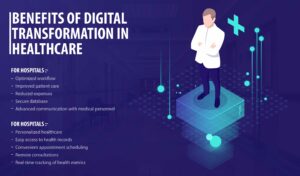Digital transformation is influencing the performance of nearly all industries, and healthcare is no exception. Nowadays, it’s imperative for the healthcare industry to offer improved patient care digitally no matter where they are. Digital transformation in healthcare market is all about implementing innovative technologies that are aimed at enhancing work efficiency in hospitals as well as taking patient care to a whole new level. In fact, more and more different opportunities come today in the division of digital transformation in healthcare industry and in diagnostics.
Why digital transformation in healthcare is important, what benefits it can bring for the health industry and its consumers, and what future digital trends should we anticipate there? In this article, we’ll cover it in detail.
Also read: The Importance of Information Technology in Healthcare
But before we proceed, let’s define what actually digitalization in the medical field means.
Digital transformation in healthcare is referring to the use of digital technologies to enhance and transform healthcare processes, services, and outcomes.
Some examples of digital transformation in healthcare are the following:
Electronic Health Records (EHRs):
EHRs are digital records of a patient’s health data that can be accessed and shared by healthcare providers. EHRs help in improving the accuracy and efficiency of healthcare delivery by offering real-time access to patient information and mitigating the need for paper records.
Telemedicine:
One of the most prominent changes in the healthcare industry is the growth of virtual doctor visits. It helps in enabling meeting the specialists at the most comfortable time and from nearly anywhere, which is much more cost and time-efficient rather than an in-person hospital visit.
Based on the research, approximately 83% of surveyed patients are ready to implement telemedicine, which has become even more popular after the COVID-19 pandemic outbreak worldwide in 2020.
Telemedicine is allowing healthcare providers to provide care remotely through videoconferencing, telephone, or other digital technologies. This can enhance access to care for patients in underserved areas or who have mobility limits.
Wearable Devices:
Wearable devices, such as smartwatches and fitness trackers, can gather and transmit data about a person’s health and activity levels. The healthcare providers are utilizing the data to monitor and manage a patient’s health records.
The following are the common types of health devices:
- Heart rate trackers
- Exercise & fit (type of activity, duration, distance, calories burnt, etc)
- Sweat meters (for tracking blood glucose – an essential routine of diabetics)
- Oximeters (for checking the oxygen carried in the blood – used for patients with COPD, severe cases of COVID-19, asthma, and other respiratory illnesses)
Artificial Intelligence (AI) and Machine Learning:
Digital transformation in healthcare also uses AI and machine learning. It helps in analyzing large amounts of data to recognize trends and patterns for improving healthcare outcomes. For instance, AI is analyzing medical images to support diagnoses or to predict patient outcomes.
Robotics:
Robotics in the healthcare industry to support tasks such as performing surgery, administering medication, or assisting with rehabilitation.
3D Printing:
3D printing is creating custom medical devices, such as implants and prosthetics. That are tailoring to the specific requirements of a patient.
The above were just a few examples of how digital technologies are being used to transform the healthcare industry. There are several other ways that digital transformation in healthcare is using digital technologies.
Benefits Of Digital Transformation in Healthcare
In fact, digital transformation in healthcare provides plenty of benefits for all the patients involved.
Therefore, by applying these innovations, physicians and hospitals can accelerate their workflow, and get more accurate patient data and health metrics. As well as build up a more effective treatment in a shorter period of time. All these factors can considerably impact the outcome, of course, for the better.

After you know the most popular and up-to-date technologies and trends implemented nowadays. It’s time to briefly analyze what benefits they can bring to healthcare enterprises and their patients respectively.
Also read: Technology is Making Healthcare Affordable and Accessible
Conclusion
These are only a few of the most important trends in the digital transformation in healthcare for the next decade. However, implementing these solutions to healthcare enterprises can significantly improve the entire industry’s performance!
If you are also interested in taking an initiative in the medical sector and looking for industry experts, then do not hesitate to contact us at Aeologic Technologies.
FAQs
Give an example of how digital technology is advancing healthcare.
Digital technology is making communication between healthcare providers and patients very easy. Healthcare workers can stay in touch through smartphones, email, text messaging, etc.
How healthcare is using digital technology?
Telemedicine refers to the exchange of medical information from one site to another. That too, with the help of electronic communications to improve a patient’s health.









